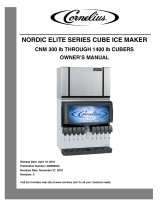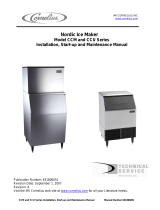
7
For the Installer (Location)
Ice-O-Matic® ice machines are designed to be installed indoors in a controlled environment. Install the ice
machine in a location where it has enough space around it to be accessible for service. A minimum of 6 inches
must be allowed at the back for air circulation on air cooled models. Try to avoid hot, dirty and crowded
locations. Be sure that the location of the machine is within the environmental limitations.
Storage Bin:
Remove the bin packaging. Tip the storage bin on its back, using parts of the packaging to protect the exterior
finish. Remove the skid and install the legs into the threaded holes in the bottom of the bin. Turn the leg
levelers all the way in preparation for leveling later. Return the bin to the upright position.
Note: Do not push the bin into position, but lift it there. Pushing a bin, especially one with ice in it, can cause
damage to the bin legs and mounts.
Install the appropriate bin top according to the instructions provided with the bin top.
Ice machine:
The ice machine is heavy, so the use of a mechanical lift is recommended for lifting the machine high enough
to install on top of the bin. After the unit is placed on the bin, line it up so it is even with the back side. Secure
the ice machine to the bin with the hardware provided with the ice machine. Remove the front panel and
remove any shipping blocks or packaging material.
Proper functioning of the bin door requires the bin door, when it is opened, to be in a stable position. If the ice
machine is too far forward on the bin, the opened door may not be stable, resulting in an unexpected closing of
the bin door.
If the ice machine is to be mounted on a bin or dispenser other than an Ice-O-Matic®, refer to the
manufacturer’s instructions for machine mounting. Ice-O-Matic® will not be responsible for damage or injury
that results from unexpected closing of the bin door as a result of the ice machine being too far forward on the
bin.
Water Limitations:
An ice machine is a food manufacturing plant: it takes a raw material, water and transforms it into a food
product, ice. The purity of the water is very important in obtaining pure ice and maximizing product life. This
section is not intended as a complete resource for water related questions, but it does offer these general
recommendations:
●Check with a water treatment specialist for a water test and recommendations regarding water filters and
treatment.
●In most cases, the water used to make ice should be filtered or treated, depending upon the water.
There is no one type of water filter that is effective in all situations. That is why a water test in important.
RO Water Limitations:
Water conductivity must be no less that 35 microSiemens/cm.
Notice:
Ice-O-Matic® ice machines are designed and manufactured with the highest regard for safety and performance
and meet or exceed the standards of UL, NSF and CUL.
Ice-O-Matic® assumes no liability or responsibility of any kind for products manufactured by Ice-O-Matic® that
have been altered in any way, including the use of any part and/or other components not specifically approved
by Ice-O-Matic®.
Ice-O-Matic® reserves the right to make design changes and/or improvements at anytime. Specifications and
design are subject to change without notice.























